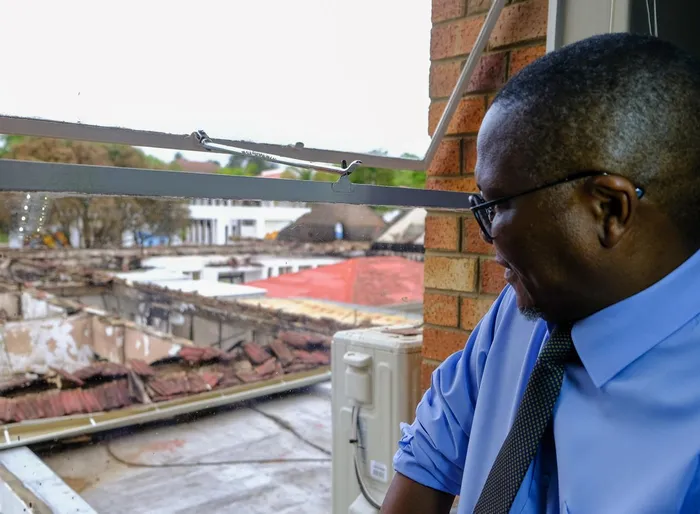
Prof Sakhela Buhlungu is watching the destruction caused by last week's violent protests.
Image: SUPPLIED
The University of Fort Hare is counting the cost of a week of violent protests that left its campuses looking like war zones and caused damage estimated at up to R500m.
Vice-Chancellor Prof Sakhela Buhlungu, who has been accused by some students of being too old for the job, told IOL the attacks were politically orchestrated and aimed at forcing him out so others could "plunder university resources".
“And they want me out of the hot seat,” he said, “so they can take over and plunder university resources.”
Students set fire to at least seven buildings, including the student affairs building — once a residence of the late former president Nelson Mandela — as well as the administration block, Faculty of Agriculture and a newly refurbished clinic.
Eight students have been arrested.
Classes have been suspended, and a decision on when students can return will be made at the end of the week, Buhlungu said.
Buhlungu, who was appointed vice-chancellor in 2017 and was serving a second term, believed the protests were strategically designed to paralyse the university and tarnish its reputation.
“They were strategically chosen to disrupt operations,” he said.
“The idea was to erase our legacy of renewal, to set us back, and to get me out.”
The damage included destroyed offices for finance, academic administration and ICT infrastructure. The refurbishment of the clinic cost R16m to R20m.
“We’re still waiting for a final assessment, but the damage is between R300m and R500m,” he said.
Buhlungu said the university obtained a court interdict to stop the violence, but attacks continued before police could respond.
The eight students arrested have appeared in the Alice Magistrate’s Court and were released on warning.
They are due back in court on November 26.
He said the attacks were linked to broader political and criminal networks.
“There are two trials ongoing — one for murders in 2022–23 and another for fraud and corruption involving 17 people and several companies.
"These were postponed recently. There’s another murder trial in November,” he said.
The Special Investigating Unit has also made 33 disciplinary referrals for academic fraud involving multiple individuals, including politicians, he said.
“All of this is happening simultaneously.
"They’re creating a sideshow to shift attention from the legal cases. Of course, they can burn buildings, but they’ll never burn the soul of this university.”
Buhlungu, who recently turned 65, defended the council’s decision to extend his term until January 2027.
“That’s council’s prerogative. I didn’t appoint myself. Other universities have VCs older than me. This isn’t a student issue — it’s a convenient excuse,” he said.
He said the university’s clean governance and infrastructure savings had made it a target.
“We’ve closed the taps. Those behind the attacks are now salivating over tenders to rebuild. But they’ll be disappointed. We’re not going to allow a feeding frenzy.”
Despite the chaos, Buhlungu said he was not afraid.
“There’s been shooting before — at my deputy, at my house. But life has to go on. I’m not saying I’m not afraid, but there’s work to be done.”
He warned that the violence could harm Fort Hare’s future.
“This is a dress rehearsal for succession. Who’ll want to apply to be VC when buildings are burning? We risk chasing away capable academics and attracting those who’ll sell the soul of the university.”
Ex-SRC president Aphelele Swazi Khalakahla said there was no SRC as the term ended and no new elections was held.
"That is a sign of a governance crisis ... some students are demanding that there should be SRC elections, not an interim SRC that is going to be imposed by management," he said..
"The second reason for that is maladministration, as well as a governance crisis and a lack of basic services to students.
"Maladministration means that in most managerial and director positions, there are either no people at all or acting people.
"For example, in the financial aid office, there is no manager."
Khalakahla alleged at the maintenance and transport departments, there were no managers.
"So that’s a purely administrative issue.
"The council is also interim, and these positions are acting.
"That is a crisis."
He said students are frustrated.
"There is not enough personnel, and 23 residences are without security.There is sewage spillage everywhere.Residences have no stoves, no hot water, no fridges, no microwaves. They are not up to standard."
Khalakahla said for the VC to say the protest was politically orchestrated was just a "political statement meant to shift attention from the real demands and frustrations of students".
"I’m going to say that as it is, because I know the media becomes selective," he said.
"There is also a policy that says if you are given a term or any appointment post-retirement, it should be a minimum of a year.
"But for him, it’s a year and five months.
"That must be straightforward again. It’s against national policy and against the university statute. The extension is unlawful. So the vice-chancellor is here unlawfully."
Another demand, he said, was for security quotas for local employees.
"We are saying that at least for non-academic and unskilled posts, where the Alice community can benefit, it must benefit.
"The Alice community must benefit as the community that houses and gave land to the university. That’s not wrong.
"Part of what the university is meant to do is serve the community.
"So we are saying the university should serve its locals. And it’s not only about quotas for local employment – we are also saying there should be quotas for South Africans compared to foreigners.
"At least 60% must be South Africans in academic areas such as professors and lecturers, and 40% can be foreign nationals."
He said students were dying under the incumbent VC.
"Students live in inhumane conditions under him."
IOL News